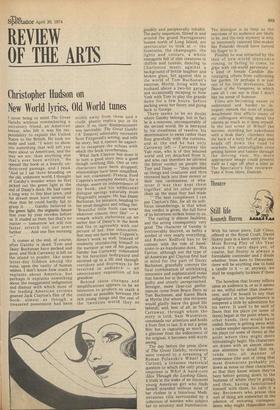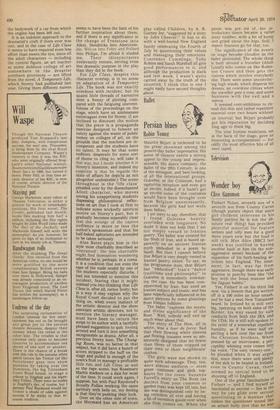Theatre
Still life
Kenneth Hurren
With his latest piece, Life Class, offered at the Royal Court, David Storey puts in a keen entry for the Most Boring Play of the Year Award. It's early days yet, of course, but Storey is always a formidable contender and I doubt whether, from here to December, there will be anything else to hold a candle to it — or, anyway, we shall be singularly luckless if there is.
The boredom that Storey inflicts upon an audience is, or so it seems to me, wilful rather than inadvertent, and I'm bound to say that indignation at his impertinence is tempered a little by admiration for his nerve. It used to be said of Ibsen that his plays (or some of them) began at the point where, in other hands, they would have ended. Storey is getting away with a rather simpler operation: he ends his plays (or some of them) at the point where they might more stimulatingly begin. His characters are drawn with an almost obsessive attention to detail that extends into all manner of irrelevance (the sort of thing that most dramatists probably jot down as notes on their characters, so that they know where they've been before getting down to the business of where they're going), and then, having familiarised himself with them, he calls it a day. Reviewers who praise this sort of thing are somewhat in the position of motoring correspondents who might rhapsodise over
the bodywork of a car from which the engine has been left out. It is an indolent approach to the dramatist's craft if there ever was one, and in the case of Life Class it seems to have required even less effort than meets the eye, since all the adult characters — including the central figure, an art teacher at some dubious college of art somewhere in the drearier northern provinces — are lifted from the novel, A Temporary Life, which Storey had published last year. Giving them different names
seems to have been the limit of his further inspiration about them, and if there is any significance in the change of Freestone into Allott, Hendricks into Abercrom,bie, Wilcox into Foley and Pollard into Philips, I'm afraid it eluded
me. Their idiosyncrasies irrelevantly remain, serving even less dramatic purpose in the play than they did in the book.
For Life Class, despite this character overlap, is in no sense an adaptation of A Temporary Life. The book was not exactly overdone with incident, but its quaint little threads of narrative were a frenzy of plotting compared with the fatiguing uneventfulness of the proceedings on the stage, which have an aimlessness extravagant even for Storey. (I am inclined to discount the notion that the piece is a propaganda exercise designed to foment an outcry against the waste of public money on colleges of art, on the grounds that the teachers are incompetent and the students have no talent. It may be that some auditors, desperate for some sort of theme to cling to, will take it i that way, but I doubt whether it s Storey's intention, and indeed my suspicion is that he regards the state of affairs he depicts as not altogether undesirable.) The scene throughout is the 'life class' presided over by the disenchanted Allott character, who moves among his unappetising students dispensing philosophical reflections on art that I took at first to indicate some wickedly satirical motive on Storey's part, but it gradually becomes miserably clear that this scourge of the captive audience is more or less the author's spokesman and that his half-baked aphorisms are intended to be taken seriously. Alan Bates plays him in the style most charitably described as 'restrained'; the less charitable might find themselves wondering whether he is, perhaps, in a coma. It is a condition that not even the rape of the nude model by one of the students especially disturbs. I had not intended to mention this incident, fearing that it might mislead you into thinking that Life Class is, after all, rather lively; but in a way it may explain why the Royal Court decided to put the thing on, when every instinct of the artistic director and the three associate artistic directors, not to mention the literary manager, must have been to return the scnpt to its author with a tactfully phrased suggestion to quit fooling around and turn it into something recognisable as drama. After all, a previous Storey item, The Changing Room, was no better in that respect, but it did have a bunch of actors stripped to the buff on the stage and pulled in enough of the town's fruit to manage a profitable little run; and Life Class, as well as the rape scene, has Rosemary Martin starkers on a dais for most of the time. It could work again, I suppose, but with Paul Raymond's Royalty Follies working the same territory with bells on, my feeling is that they're pushing their luck.
Over on the other side of town, the Mermaid has an American play called Children, by A. R. Gurney Jnr, "suggested by a story by John Cheever." It has to do with a well-heeled New England family celebrating the Fourth of July by questioning their values and massaging their emotions. Constance Cummings, Toby Robins and Sarah Marshall all give good performances in it, and although the production is slack and last week, I wasn't quite carried away by the truth of the situation, I think this is one I might easily have second thoughts .about.



































 Previous page
Previous page